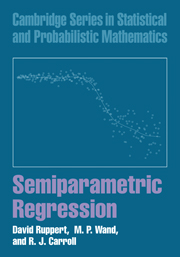Book contents
- Frontmatter
- Contents
- Preface
- Guide to Notation
- 1 Introduction
- 2 Parametric Regression
- 3 Scatterplot Smoothing
- 4 Mixed Models
- 5 Automatic Scatterplot Smoothing
- 6 Inference
- 7 Simple Semiparametric Models
- 8 Additive Models
- 9 Semiparametric Mixed Models
- 10 Generalized Parametric Regression
- 11 Generalized Additive Models
- 12 Interaction Models
- 13 Bivariate Smoothing
- 14 Variance Function Estimation
- 15 Measurement Error
- 16 Bayesian Semiparametric Regression
- 17 Spatially Adaptive Smoothing
- 18 Analyses
- 19 Epilogue
- A Technical Complements
- B Computational Issues
- Bibliography
- Author Index
- Notation Index
- Example Index
- Subject Index
2 - Parametric Regression
Published online by Cambridge University Press: 06 July 2010
- Frontmatter
- Contents
- Preface
- Guide to Notation
- 1 Introduction
- 2 Parametric Regression
- 3 Scatterplot Smoothing
- 4 Mixed Models
- 5 Automatic Scatterplot Smoothing
- 6 Inference
- 7 Simple Semiparametric Models
- 8 Additive Models
- 9 Semiparametric Mixed Models
- 10 Generalized Parametric Regression
- 11 Generalized Additive Models
- 12 Interaction Models
- 13 Bivariate Smoothing
- 14 Variance Function Estimation
- 15 Measurement Error
- 16 Bayesian Semiparametric Regression
- 17 Spatially Adaptive Smoothing
- 18 Analyses
- 19 Epilogue
- A Technical Complements
- B Computational Issues
- Bibliography
- Author Index
- Notation Index
- Example Index
- Subject Index
Summary
Introduction
Each of the problems described in the previous chapter can benefit from regression analysis. In this book we focus on the combination of classical parametric regression techniques and modern nonparametric regression techniques to develop useful models for such analyses. Therefore, it is essential to have a good grounding in the principles of parametric regression before proceeding to the more complicated semiparametric regression chapters. In particular, some of the theoretical aspects of regression should be well understood since these are important in extensions to semiparametric regression. The present chapter can serve as either a brief introduction to parametric regression for readers without a background in that field or as a refresher for those with a working knowledge of parametric regression but who could benefit from a review. If you are very familiar with parametric regression methodology and theory, then this chapter could be skimmed. Of course, this brief introduction can only cover the main concepts and a few special models. Many widely used parametric models are not discussed. This chapter provides sufficient background in parametric regression for the chapters to follow. However, readers wishing to apply parametric regression models may consult a textbook on parametric regression such as Weisberg (1985), Neter et al. (1996), or Draper and Smith (1998).
Note, moreover, that Section 2.5 contains some new perspectives on parametric regression that are relevant to later chapters on semiparametric models, so this is worth covering regardless of experience.
Toward the end of the chapter we describe some limitations of parametric regression. Most of the remainder of the book is concerned with extensions of parametric regression that have much more flexibility.
- Type
- Chapter
- Information
- Semiparametric Regression , pp. 15 - 56Publisher: Cambridge University PressPrint publication year: 2003



